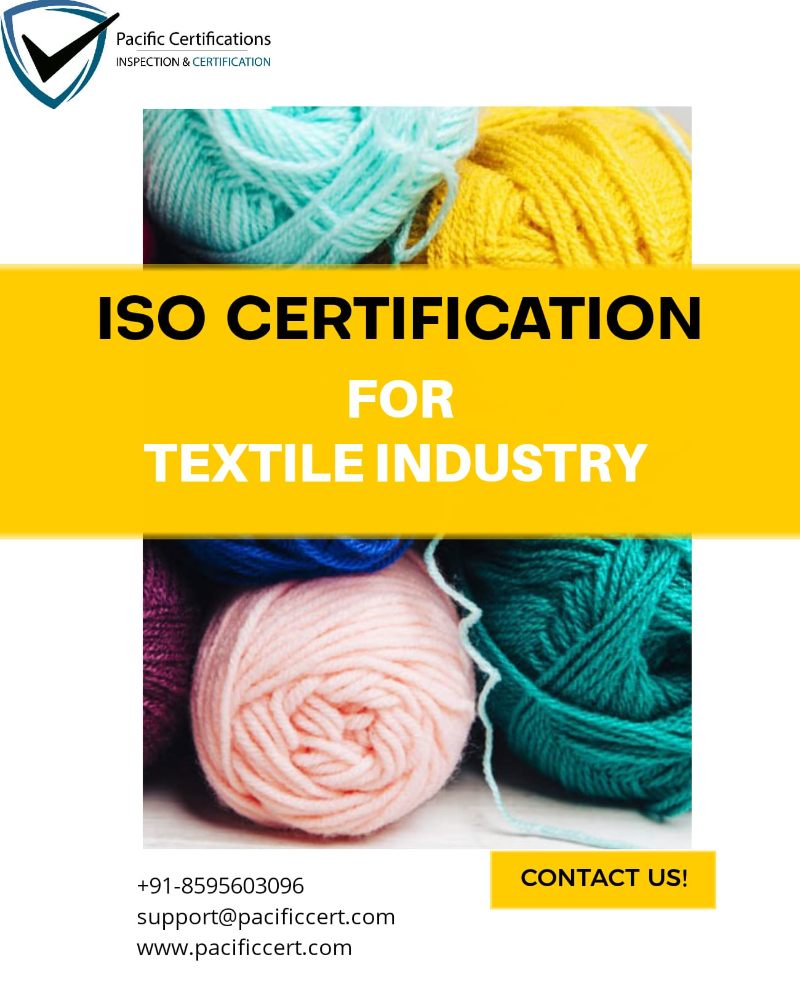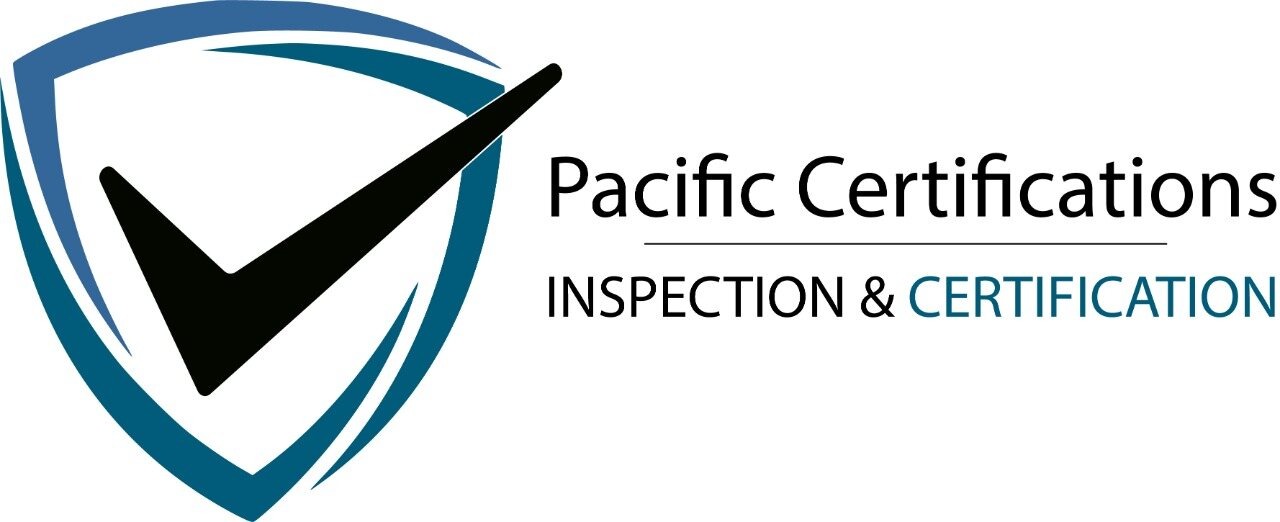ISO Certifications for Textile Industry, Requirements and Benefits

Introduction
The textile industry operates within complex manufacturing environments where spinning mills, weaving facilities, dyeing units, and garment manufacturers must manage intricate production processes involving fiber selection, chemical dyeing, finishing operations, and quality control for color fastness, tensile strength, and dimensional stability. Businesses face operational challenges including substantial water consumption averaging 164 liters per kilogram of processed material, extensive chemical usage exceeding 449 grams per kilogram for dyeing, and environmental compliance pressures regarding wastewater containing dissolved dyes and heavy metals.
ISO certifications provide textile businesses with systematic frameworks to standardize production controls, implement environmental management practices, and demonstrate compliance with customer requirements and regulatory standards. Major retail buyers increasingly mandate documented quality systems, while environmental legislation imposes strict limits on wastewater pollutant discharge and hazardous chemical usage.
Textile manufacturers use ISO standards to ensure consistent production quality, minimize defects, and enhance operational efficiency
Quick Summary
ISO certifications provide textile businesses with internationally recognized frameworks to manage production quality through ISO 9001, environmental responsibility through ISO 14001, workplace safety through ISO 45001, and energy efficiency through ISO 50001. These standards address the textile industry's critical needs for color consistency, chemical safety, wastewater treatment compliance, and worker protection while supporting sustainability commitments.
For more information on how we can assist your textile business with ISO certifications, contact us at [email protected].
Applicable ISO Standards for Textile Industry
Below are the most relevant ISO standards applicable to spinning mills, weaving facilities, dyeing and finishing operations, and garment manufacturing units:
ISO 9001:2015 - Quality Management System (QMS)
This standard enables textile manufacturers to establish documented procedures controlling fiber selection, spinning parameters, weaving specifications, dyeing consistency, and final product characteristics ensuring color uniformity, dimensional stability, and fabric strength meet customer specifications. Implementation reduces customer rejections from quality variations including color shading differences and fabric defects
ISO 14001:2015 - Environmental Management System (EMS)
Environmental management addresses the textile industry's intensive water consumption, wastewater generation containing reactive dyes and heavy metals, air emissions from volatile organic compounds, and solid waste including fabric trimmings. This standard helps textile businesses implement controls for water optimization, wastewater treatment, chemical substitution, and waste segregation that reduce environmental impact while satisfying discharge permits.
ISO 45001:2018 - Occupational Health and Safety Management System (OH&S)
Textile operations involve significant hazards including chemical exposure to reactive dyes and formaldehyde-based resins, respiratory risks from airborne fiber dust, heat stress in dyeing areas, machinery hazards, and ergonomic risks during garment assembly. This standard establishes frameworks for hazard identification, exposure monitoring, personal protective equipment requirements, and ventilation controls that reduce workplace injury rates.
ISO 50001:2018 - Energy Management System (EnMS)
Energy costs represent substantial expenses in textile manufacturing where steam generation for dyeing, thermal energy for drying, compressed air for weaving, and electric power for spinning consume significant resources. This standard provides structured approaches to measure energy consumption, identify efficiency improvements, establish baselines, and implement reduction projects that lower costs while decreasing carbon footprint
ISO 26000:2010 - Social Responsibility
This guideline assists organizations in promoting and implementing socially responsible practices. In the textile industry, it can help address issues like labor rights, fair wages, and responsible sourcing of raw materials.
ISO 17025:2017 - General requirements for the competence of testing and calibration laboratories
For textile testing laboratories, this standard provides guidelines for ensuring accurate and reliable testing and calibration procedures.
Click here to find out more applicable standards to your industry
What are the Requirements of ISO Certifications for Textile Businesses?
Textile manufacturers seeking ISO certification must establish and maintain documented policies, procedures, and records aligned with the selected ISO standards. Key requirements include the following:
ISO 9001:2015 – Quality Management Systems
Define quality objectives for color specifications, fabric weight tolerances, tensile strength minimums, dimensional stability limits, and appearance standards with measurable acceptance criteria
Implement documented procedures for raw material inspection, spinning process controls, weaving specifications, dyeing recipe management, finishing parameters, and final product testing
Establish calibration schedules for testing equipment including tensile testers, color spectrophotometers, weight scales, dimensional measuring devices, and pH meters
Maintain records of customer specifications, product non-conformances, rework decisions, corrective actions, and preventive measures addressing root causes
Control supplier qualification for fibers, yarns, chemicals, dyes, and finishing agents through approved vendor assessments and incoming material verification
Conduct management reviews analyzing production metrics, customer complaints, quality costs, and continuous improvement initiatives targeting defect reduction
ISO 14001:2015 – Environmental Management Systems
Identify environmental aspects including water consumption, chemical usage, wastewater discharge, air emissions, solid waste generation, and energy consumption
Establish environmental objectives with measurable targets for water reduction, dye recovery rates, pollutant discharge limits, waste minimization, and chemical substitution
Implement controls for wastewater treatment operations using coagulation, biological treatment, membrane filtration, or wetland systems achieving discharge standards
Monitor effluent parameters including biological oxygen demand, chemical oxygen demand, suspended solids, pH levels, heavy metal concentrations, and color units
Maintain compliance records for environmental discharge permits, monitoring reports, hazardous waste manifests, and regulatory inspection findings
Conduct regular environmental impact assessments evaluating significance of aspects and establishing pollution prevention programs targeting resource efficiency
ISO 45001:2018 – Occupational Health and Safety
Conduct hazard assessments for chemical exposure, fiber dust inhalation, machinery operations, heat stress, ergonomic risks, and electrical hazards
Implement exposure monitoring programs measuring airborne chemical concentrations, particulate levels, noise exposure, and thermal stress conditions
Establish personal protective equipment requirements including respiratory protection for chemical exposure, chemical-resistant gloves, protective eyewear, hearing protection, and safety footwear
Provide safety training for equipment operators, chemical handlers, and maintenance personnel addressing identified hazards and emergency response procedures
Install local exhaust ventilation systems at dyeing areas, printing stations, and finishing operations reducing airborne contaminant levels
Investigate workplace incidents and occupational illnesses documenting root causes, immediate corrective actions, and systemic improvements preventing recurrence
ISO 50001:2018 – Energy Management Systems
Conduct energy review identifying significant energy uses across spinning, weaving, dyeing, finishing, and support systems
Establish energy baselines documenting consumption per kilogram of production normalized for product mix and operating conditions
Set energy performance indicators with measurable targets for specific energy consumption reduction and efficiency improvement percentages
Implement action plans addressing motor efficiency, steam system optimization, heat recovery, compressed air management, and variable frequency drives
Monitor energy consumption data by production area, shift, and product type enabling performance tracking and variance investigation
Conduct regular management reviews evaluating progress toward energy objectives and approving capital investments for efficiency projects
ISO/IEC 27001:2022 – Information Security Management
Implement access controls restricting design files, customer specifications, and proprietary dyeing recipes to authorized personnel through authentication systems
Establish data backup procedures for production formulations, quality records, customer information, and intellectual property ensuring business continuity
Define information classification schemes identifying confidential customer data, proprietary processes, and sensitive business information requiring protection
Conduct employee training on password security, phishing recognition, proper document disposal, and confidentiality obligations
Maintain incident response procedures for suspected data breaches including investigation protocols and customer notification requirements
ISO/IEC 17025:2017 – Testing and Calibration Laboratories
Demonstrate technical competence of testing personnel through qualification records, training documentation, and competency assessment programs
Establish measurement traceability linking test equipment calibration to national or international measurement standards through certified reference materials
Implement method validation procedures demonstrating accuracy, precision, repeatability, and reliability of textile testing methods
Maintain quality control programs including reference samples, duplicate testing, and interlaboratory comparisons verifying result consistency
Document measurement uncertainty calculations for all reported test results ensuring appropriate interpretation by customers
Tip: Integrate digital manufacturing execution systems that continuously capture production parameters, quality test results, environmental monitoring data, energy consumption metrics, and safety incident records into centralized databases, creating unified documentation platforms that simultaneously support ISO 9001 quality requirements, ISO 14001 environmental tracking, ISO 45001 safety management, and ISO 50001 energy monitoring while eliminating redundant manual record-keeping and ensuring real-time audit readiness.
For more information on how we can assist your textile business with ISO certifications, contact us at [email protected].
What are the Benefits of ISO Certifications for Textile Businesses?
ISO certifications provide textile manufacturing companies with strong operational and commercial advantages, including listed below are the key benefits for ISO standards applicable to spinning mills, weaving facilities, dyeing operations, and garment manufacturers.
Enhanced product quality consistency reduces customer rejections, minimizes rework costs, and ensures finished textiles meet specifications for color, strength, and appearance across production batches
Improved environmental performance and regulatory compliance lowers water consumption by optimizing dyeing processes, reduces chemical usage, minimizes wastewater pollutant loads, and ensures permit adherence while supporting sustainability commitments
Stronger market access and global competitiveness as over 60% of major international retailers now require ISO certification from suppliers, opening doors to larger contracts and premium brand partnerships
Better workplace safety and health protection decreases chemical exposure levels, reduces respiratory illnesses from fiber dust, lowers injury rates, and improves employee morale through systematic hazard controls
Greater operational efficiency and cost reduction with companies reporting production time reductions up to 25%, waste decreases of 30%, and profit margin improvements reaching 15% through streamlined processes
Reduced energy consumption and costs through systematic energy management achieving 25% conservation improvements while lowering carbon footprint and operational expenses
Enhanced brand reputation and consumer trust particularly among environmentally and socially conscious customers increasingly demanding certified sustainable and ethically produced textiles
Improved testing credibility and customer confidence when laboratory certifications provide assurance in reported quality data supporting product claims and performance specifications
Better risk management and supply chain resilience through structured approaches identifying raw material vulnerabilities, chemical availability concerns, and operational risks requiring mitigation strategies
Streamlined export compliance and international trade as many countries require ISO certification for textile imports, facilitating access to foreign markets and regulatory adherence
The global textile market valued at USD 702.97 billion in 2026 projects growth to USD 919.08 billion by 2030 at a compound annual growth rate of 6.9%, with Asia-Pacific representing the fastest-growing regional market. International regulatory frameworks increasingly enforce strict environmental compliance for wastewater discharge quality and restricted substance lists limiting hazardous chemicals.
Textile manufacturers implementing ISO systems demonstrate measurable improvements including 25% production time reductions, 30% waste decreases, and up to 15% profit margin enhancements. Industry outlook indicates accelerating shift toward sustainable manufacturing, technology adoption through Industry 4.0 integration, expansion of digital printing reducing water consumption, and increasing development of bio-based and recycled fibers.
How Pacific Certifications Can Help
Pacific Certifications, accredited by ABIS, acts as an independent certification body for textile manufacturing businesses by conducting impartial audits against applicable ISO standards. Our role is to objectively assess whether documented management systems and textile production operations, chemical management practices, environmental controls, and workplace safety procedures conform to international ISO requirements, based strictly on verifiable evidence and operational records.
We support textile industry providers through:
Independent certification audits conducted in accordance with ISO/IEC 17021 for quality, environmental, safety, energy, and information security management systems
Practical assessment of actual textile manufacturing operations, dyeing process controls, wastewater treatment facilities, chemical exposure monitoring programs, and workplace safety measures
Clear audit reporting reflecting conformity status, observations regarding implementation effectiveness, and certification decisions based on documented evidence
Internationally recognized ISO certification upon successful compliance demonstration that enhances credibility with brand customers and regulatory authorities
Surveillance and recertification audits to maintain certification validity, verify continued conformance, and support continuous improvement initiatives
Contact us
If you need support with ISO certification for your textile business, contact us at [email protected] or +91-8595603096.
Author: Pushpinder K
Read more: ISO Certifications for Leather Industry-Applicable standards-Requirements and Benefits

